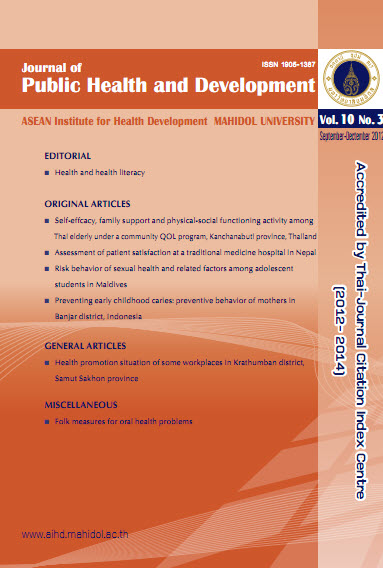Self-efficacy, family support and physical-social functioning activity among Thai elderly under a community QOL program, Kanchanaburi province, Thailand
Main Article Content
Abstract
This study describes the physical-social functioning activity of the elderly and examines the relation-
ship between self-efficacy, family support and physical-social functioning activity among elderly living in
a community under QOL program in Kanchanaburi province, using cross-sectional design. A total of 289
self-administered questionnaires for Thai elderly were used to collect data using stratified sampling.
About 48% of the studied elderly had good physical-social functioning activity. However, household-
activity and leisure time activity predominated over regular exercise. Over half (60%) of the respondents
had either high or moderate self-efficacy while 51.9% had high family support. Self-efficacy and family
support were positively correlated with the physical-social functioning activity of the elderly. Multiple lin-
ear regression analysis predicted self-efficacy and family support as significant predictors of physical-social
functioning activity (p<0.001, R-Sq (adj) =43.0%), when adjusted with other factors.
This finding suggests higher level of the self-efficacy and family support, higher level of the physical-
social functioning activity of the Thai elderly involving in a QOL program. The authors recommended that
several interventions to increase self-efficacy and family support should be strengthened and continued for
health promoting behavior targeting the elderly people.
ship between self-efficacy, family support and physical-social functioning activity among elderly living in
a community under QOL program in Kanchanaburi province, using cross-sectional design. A total of 289
self-administered questionnaires for Thai elderly were used to collect data using stratified sampling.
About 48% of the studied elderly had good physical-social functioning activity. However, household-
activity and leisure time activity predominated over regular exercise. Over half (60%) of the respondents
had either high or moderate self-efficacy while 51.9% had high family support. Self-efficacy and family
support were positively correlated with the physical-social functioning activity of the elderly. Multiple lin-
ear regression analysis predicted self-efficacy and family support as significant predictors of physical-social
functioning activity (p<0.001, R-Sq (adj) =43.0%), when adjusted with other factors.
This finding suggests higher level of the self-efficacy and family support, higher level of the physical-
social functioning activity of the Thai elderly involving in a QOL program. The authors recommended that
several interventions to increase self-efficacy and family support should be strengthened and continued for
health promoting behavior targeting the elderly people.
Article Details
How to Cite
1.
Shrestha B, Sermsri S, Hongkrailert N. Self-efficacy, family support and physical-social functioning activity among Thai elderly under a community QOL program, Kanchanaburi province, Thailand. J Public Hlth Dev [internet]. 2012 Dec. 26 [cited 2026 Feb. 26];10(3):3-16. available from: https://he01.tci-thaijo.org/index.php/AIHD-MU/article/view/4671
Section
Original Articles


